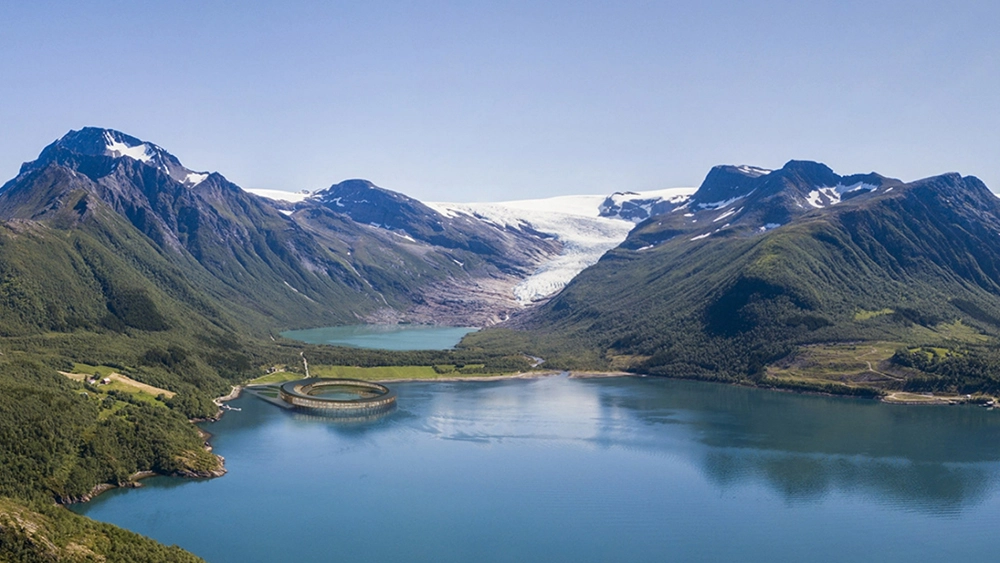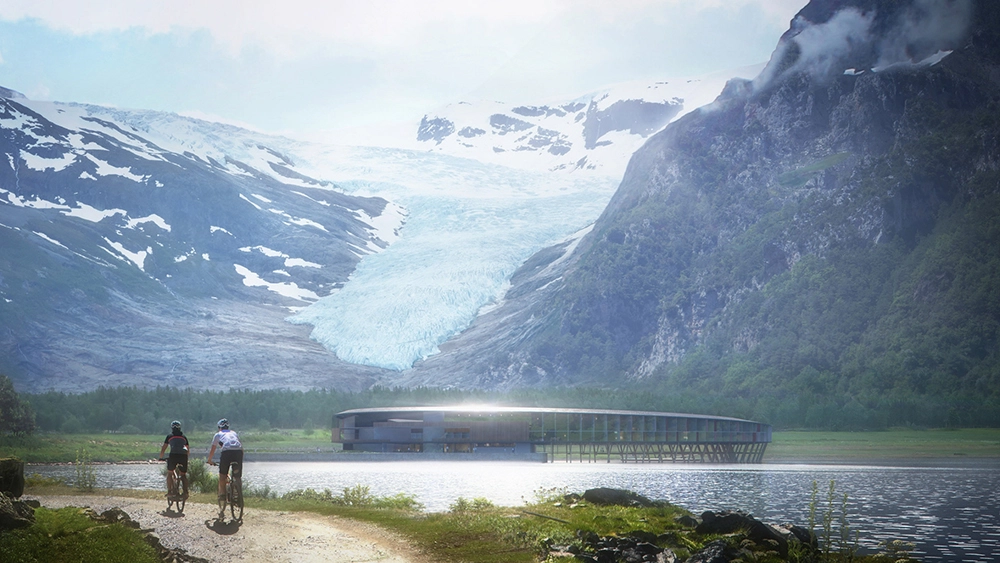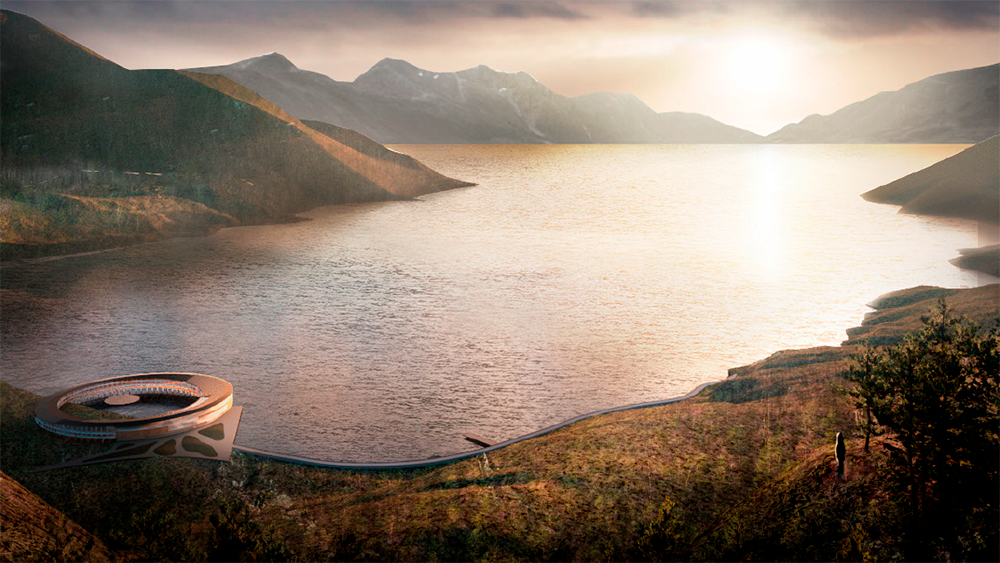In what’s expected to be the world’s first energy-positive hotel, the Six Senses Svart location is expected to open in Norway in 2024.
The newest luxury destination in the Six Senses family will be located at the base of Norway’s Svartisen glacier. It will be carbon neutral and run entirely off-grid.
According to Neil Jacobs, CEO of Six Senses, the hotel is “pushing boundaries” of what the destination and the chain can do. It currently operates 21 sustainable properties across the globe. But Svart will stand out and set a new bar, says Jacobs.
“The concept has become bigger than the project itself, as it will provide a futuristic showcase for what can be achieved in terms of sustainability and energy solutions, and therefore a blueprint within our hospitality industry and the development sector in general,” Jacobs said in a statement.
Svart
Svart, which means “black and blue” in Norse, is an homage to the region’s glaciers. It will be the first structure of its kind, built and designed to adhere to the highest energy-efficiency standards within the northern hemisphere.
The 94-room property will be fully off-grid, using solar energy to power the boat shuttle, hotel, and adjacent operations. The self-sustaining property will feature a renewable infrastructure, waste and water management, and recycling. Food will be sourced locally. The property will also feature a Net Zero Lab in order to deliver guests a truly net-zero stay.

“To enhance the vision of Svart, we have established a Net Zero Lab, a vehicle for developing and taking to market the technology created by us in a joint effort with Six Senses to reach the common goal for net-zero travel,” said Jan-Gunnar Mathisen, CEO of the project’s owner and developer.
“This means the guest journey will have zero environmental impact from start to end. The mission is to achieve common ground for all stakeholders pushing the technology to the next level to benefit the resort and the industry at large.”
Designed in the spirit of coastal cabins called rorbus, the hotel will be suspended above the Holandsfjorden fjord in order to lessen the property’s impact on the glacial environment. Inside the hotel, rooms will feature the latest in sustainable luxury and artwork that reflects the local culture.
Like other Six Senses properties, Svart will focus on wellness programs including Svart Touch, a technology that adapts rooms to users’ needs based on a scan that senses stress levels. The hotel will highlight regional healing methods in its spa.
“Six Senses is redefining the travel experience through technological innovation, ground-breaking design, and exceptional guest wellness journey by creating a carbon-neutral visionary destination where we can showcase the core pillars of what modern hospitality design and operation can achieve,” Svart development director Ivaylo Lefterov said.

Svart could be the first of many energy-positive hotels for Six Senses. It has 33 properties currently in development, and the demand for sustainable hotels continues to rise. A recent survey found 61 percent of travelers are prioritizing sustainable travel as a result of the pandemic.
Nordic sustainability
Svart could also play a role in a new sustainable marketing campaign launching in partnership between The European Travel Commission and The Nordic Council of Ministers.
Announced earlier this year, the campaign is aimed at reinvigorating travel across the Nordic countries following travel dips as a result of the pandemic. The coalition of participating destinations includes Denmark, the Faroe Islands, Finland, Greenland, Iceland, Norway, and Sweden.
The effort will span business-to-business and consumer-facing campaigns, aimed at “open-minded individuals who travel to broaden their minds and develop new perspectives,” the campaign said. The countries’ aren’t just unified in boosting travel, but also sustainability and innovation. The coalition cites destinations like Finland’s 41 national parks and three million saunas, which the coalition says will all be carbon neutral by 2035.
Sweden is also seeing an uptick in sustainability; according to the coalition, Gothenburg has been named the world’s most sustainable destination in the Global Destination Sustainability Index for five consecutive years, and in Stockholm, nearly 80 percent of hotels are sustainability accredited by a third-party certifying body. Sweden’s Treehotel, located in the Harads forest, is expected to open a new suspended room next month that’s covered in 350 birdhouses.

Denmark is right behind Sweden on the Index, ranking second last year for sustainability. Samso island in the middle of Denmark has been 100 percent sustainable since 2007, using wind, solar and other renewable energy. Copenhagen’s Noma restaurant, which is repeatedly ranked best in the world, is focused on sustainable, local fare.
The coalition says the Faroe Islands are known for attracting birders and hikers, but their farm tours and heimablídni (Faroese for home hospitality) experiences “are quickly gaining in popularity” as they highlight sustainability and local culture.
Greenland, too, is considered a sustainable destination for its nature-focused activities that include the northern lights, snow-shoeing, icebergs, midnight sun, and kayaking. And in Iceland, geothermal pools and three UNESCO World Heritage sites make it a sustainable travel destination. The country has also taken a strong stance on climate change, pleding to reduce emissions by 55 percent by 2030.
“From mountains, volcanoes and glaciers to fjords, lakes, forests, and black sand beaches, to progressive, environmentally-minded cities, The Nordics offer extraordinary landscapes and experiences for travelers,” Christina Koontz, U.S. Project Manager for The Nordics, said in a statement.
“Collectively, we recognize the fragility of our natural environment—our greatest asset—and are determined to both provide sustainable tourism solutions and educate our visitors to ensure future generations of residents and visitors alike can enjoy our breathtaking destinations.”


